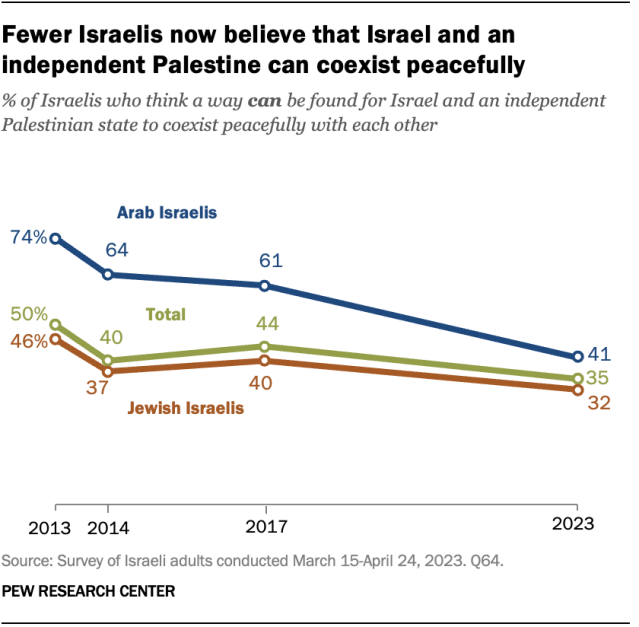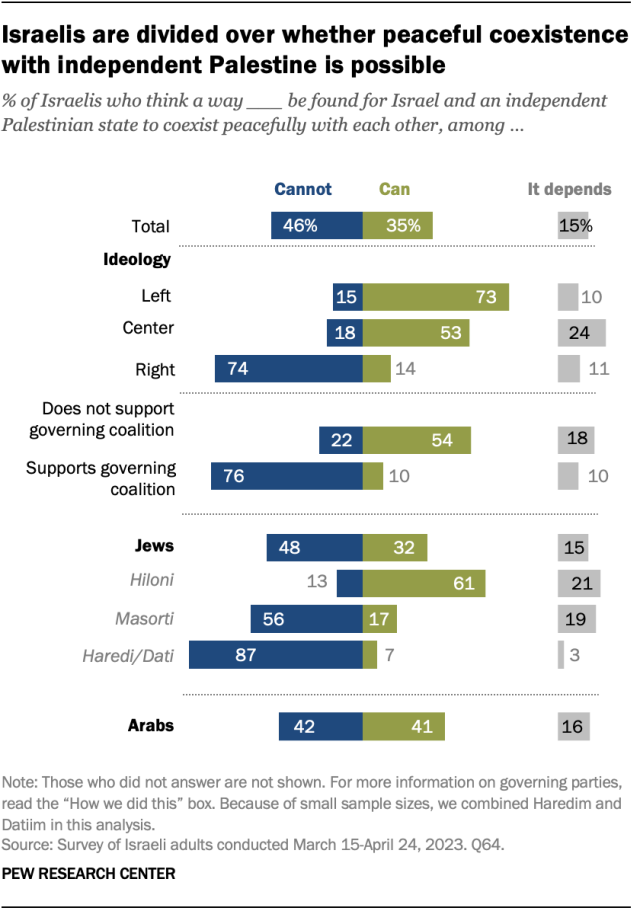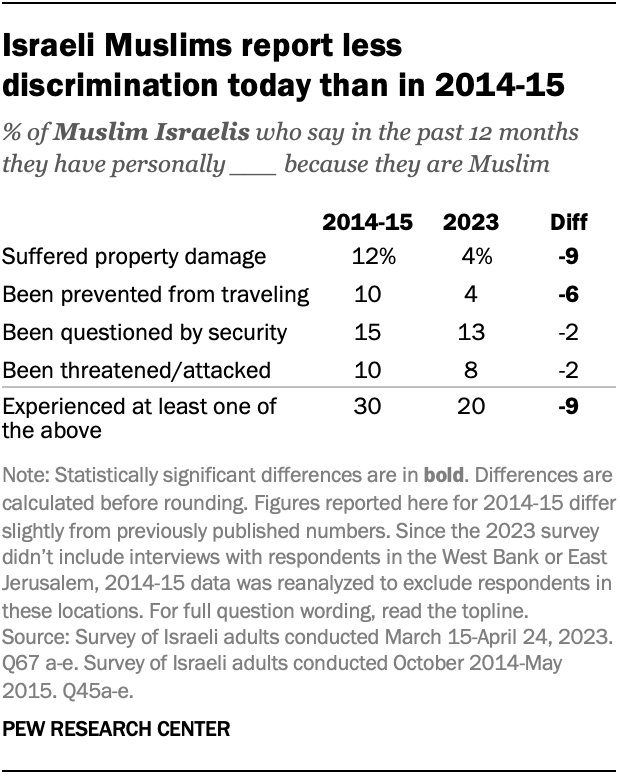(Israeli students at Tel Aviv University hold Palestinian and Israeli flags while protesting Prime Minister Benjamin Netanyahu’s new government on Jan. 16, 2023)
*
Following recent violence in the West Bank, some experts on the Israel-Palestine conflict have expressed concern that the prospects for a two-state solution are fading. And a growing share of Israelis seem to share that view, according to a recent Pew Research Center survey.
Only 35% of Israelis think “a way can be found for Israel and an independent Palestinian state to coexist peacefully,” according to the survey, which was conducted in March and April, prior to the latest violence in the West Bank. That represents a decline of 9 percentage points since 2017 and 15 points since 2013.

The feeling that peaceful coexistence is possible has decreased over the past decade among both Arabs and Jews living in Israel.
Still, views among Arab Israelis have shifted significantly more than they have among Jewish Israelis. Arab Israelis are now 33 points less likely than they were in 2013 to see the possibility of a peaceful coexistence between Israel and an independent Palestinian state. Jewish Israelis are 14 points less likely to see this possibility than in 2013.
Among the major subgroups of Jews in Israel, those who are Masorti (“traditional”) and those who are Haredi/Dati (“ultra-Orthodox” and “religious,” respectively) have grown less confident in recent years that peaceful coexistence is possible. The share of Masorti Jews who see the possibility of a peaceful coexistence has declined from 33% in 2017 to 17% this year. Among Haredi/Dati Jews, the share who see this possibility has fallen from 22% to 7%. (Because of small sample sizes, we combined Haredim and Datiim in this analysis.)
By contrast, Hiloni or “secular” Jews now express more optimism about the prospects for a two-state solution than they did in 2017 (61% today vs. 54% then).
The views of Israelis on the political left and in the center have not changed substantially since 2017. But those on the political right are considerably less likely than they were in 2017 to see the possibility of a peaceful coexistence between Israel and a Palestinian state (14% today vs. 27% in 2017).
Stark divides over whether a peaceful coexistence is possible

While Israelis broadly lack confidence in a peaceful coexistence between Israel and an independent Palestinian state, opinions vary widely across Israeli groups. For example, those who do not support Israel’s current governing coalition are much more likely than those who support the governing coalition to believe a way can be found to coexist peacefully (54% vs. 10%).
There are also large divides along ideological lines: 73% of Israelis on the political left say a way can be found for two states to coexist, compared with 53% of those in the center and 14% of those on the right.
Arab Israelis are somewhat more likely than Jewish Israelis to express optimism in the possibility of a peaceful coexistence with an independent Palestinian state (41% vs. 32%).
There are strong divisions between Jewish groups: 61% of Hiloni Jews say a peaceful coexistence is possible, while just 17% of Masorti Jews and 7% of Haredi/Dati Jews say the same.
Discrimination toward Israeli Muslims
The survey – which excluded people living in the West Bank, Gaza and East Jerusalem – also asked Muslims in Israel whether they have had recent interactions with security forces or experienced various kinds of discrimination.

Overall, 13% of Muslims in Israel say that in the last 12 months they have been stopped and questioned by security forces, while 8% say they have been physically threatened or attacked because they are Muslim. Fewer report having been prevented from traveling (4%) or having suffered damage to their home or property (4%) because they are Muslim.
Altogether, 20% of Muslims report having had at least one of these experiences in the past 12 months – down from 30% when we asked the same questions in our 2014-15 survey about religion in Israel. Muslims are also less likely today than in 2014-15 to say they’ve had a Jewish person express concern or sympathy for them (13% vs. 25%).
In the new survey, Muslim men in Israel are much more likely than Muslim women to say they have recently experienced at least one of these types of discrimination (32% vs. 9%).
*
ملخّص لقراء العربية
آخر استطلاع حول “حل الدولتين” قبل أسبوعين من حرب 7 أكتوبر
نَشرَ موقع « بيو » الذي يتمتع بمصداقية ممتازة إستطلاعات الرأي التالي في 26 أيلول/سبتمبر 2023. أي قبل أسبوعين من عملية 7 أكتوبر. وجاء فيه:
في أعقاب أعمال العنف الأخيرة في الضفة الغربية، أعرب بعض الخبراء في الصراع الإسرائيلي الفلسطيني عن قلقهم من تلاشي احتمالات حل الدولتين. ويبدو أن نسبة متزايدة من الإسرائيليين تشترك في هذا الرأي، وفقا لاستطلاع حديث أجراه مركز بيو للأبحاث.
ويعتقد 35% فقط من الإسرائيليين أنه “يمكن إيجاد طريقة لتعايش إسرائيل والدولة الفلسطينية المستقلة بسلام”، بحسب الاستطلاع الذي أجري في شهري مارس وأبريل، قبل أعمال العنف الأخيرة في الضفة الغربية. ويمثل ذلك انخفاضًا بنسبة 9 نقاط مئوية منذ عام 2017 و15 نقطة منذ عام 2013.
لقد تضاءل الشعور بإمكانية التعايش السلمي خلال العقد الماضي بين العرب واليهود الذين يعيشون في إسرائيل.
ومع ذلك، فقد تغيرت وجهات النظر بين العرب الإسرائيليين بشكل ملحوظ أكثر مما حدث بين اليهود الإسرائيليين. أصبح العرب الإسرائيليون الآن أقل ثقة بمقدار 33 نقطة مما كانوا عليه في عام 2013 بإمكانية التعايش السلمي بين إسرائيل والدولة الفلسطينية المستقلة. ويقل احتمال رؤية اليهود الإسرائيليين لهذا الاحتمال بـ 14 نقطة مقارنة بعام 2013.
من بين المجموعات الفرعية الرئيسية لليهود في إسرائيل، أصبح أولئك الماسورتيون (“التقليديون”) والحريديم/داتي (“الأرثوذكس المتطرفون” و”المتدينون” على التوالي) أقل ثقة في السنوات الأخيرة بإمكانية التعايش السلمي. . وانخفضت نسبة اليهود الماسورتيين الذين يرون إمكانية التعايش السلمي من 33% في عام 2017 إلى 17% هذا العام. بين اليهود الحريديم/الداتي، انخفضت نسبة الذين يرون هذا الاحتمال من 22% إلى 7%. (بسبب صغر حجم العينات، قمنا بدمج الحريديم والداتيم في هذا التحليل).
على النقيض من ذلك، يعبر اليهود “هيلوني” أو “العلمانيون” الآن عن تفاؤل أكبر بشأن احتمالات حل الدولتين عما كانوا عليه في عام 2017 (61% اليوم مقابل 54% آنذاك).
لم تتغير آراء الإسرائيليين من اليسار السياسي والوسط بشكل كبير منذ عام 2017. لكن الذين ينتمون إلى اليمين السياسي يؤمنون أقل بكثير مما كانوا عليه في عام 2017 بإمكانية التعايش السلمي بين إسرائيل والدولة الفلسطينية (14). % اليوم مقابل 27% في 2017).
انقسامات صارخة حول ما إذا كان التعايش السلمي ممكنًا
وفي حين يفتقر الإسرائيليون على نطاق واسع إلى الثقة في التعايش السلمي بين إسرائيل والدولة الفلسطينية المستقلة، فإن الآراء تتباين على نطاق واسع بين الجماعات الإسرائيلية. على سبيل المثال، أولئك الذين لا يدعمون الائتلاف الحاكم الحالي في إسرائيل هم أكثر ثقة بكثير من أولئك الذين يدعمون الائتلاف الحاكم بإمكانية إيجاد طريقة للتعايش السلمي (54% مقابل 10%).
هناك أيضًا انقسامات كبيرة على أسس أيديولوجية: 73% من الإسرائيليين على اليسار السياسي يقولون إنه يمكن إيجاد طريقة لتعايش دولتين، مقارنة بـ 53% من أولئك في الوسط و14% من اليمينيين.
العرب الإسرائيليون أكثر ثقة إلى حد ما من اليهود الإسرائيليين بإمكانية التعايش السلمي مع دولة فلسطينية مستقلة (41% مقابل 32%).
هناك انقسامات قوية بين الجماعات اليهودية: 61% من يهود هيلوني يقولون إن التعايش السلمي ممكن، في حين أن 17% فقط من اليهود الماسورتيين و7% من يهود الحريديم/داتي يقولون نفس الشيء.

